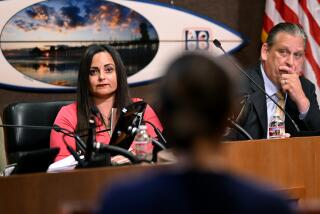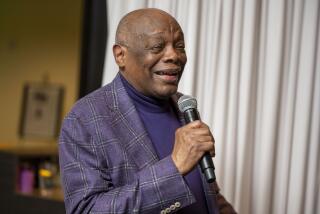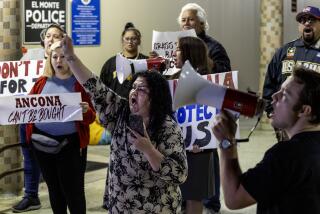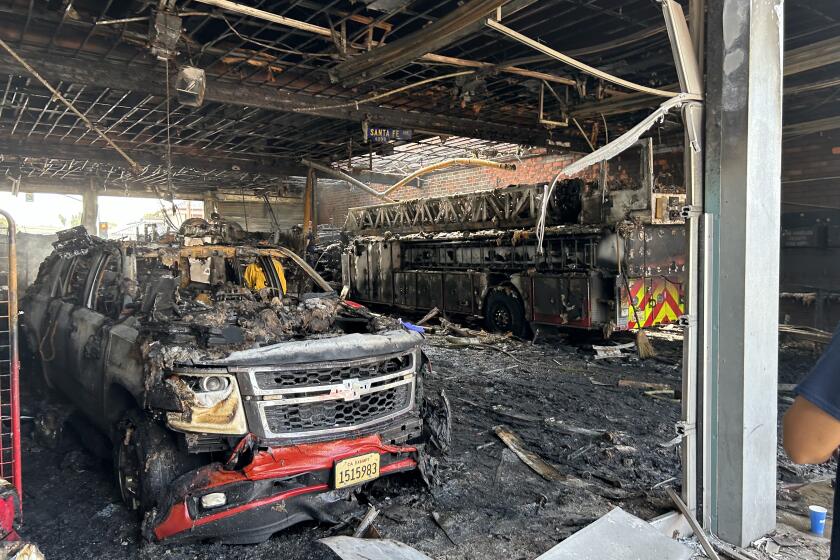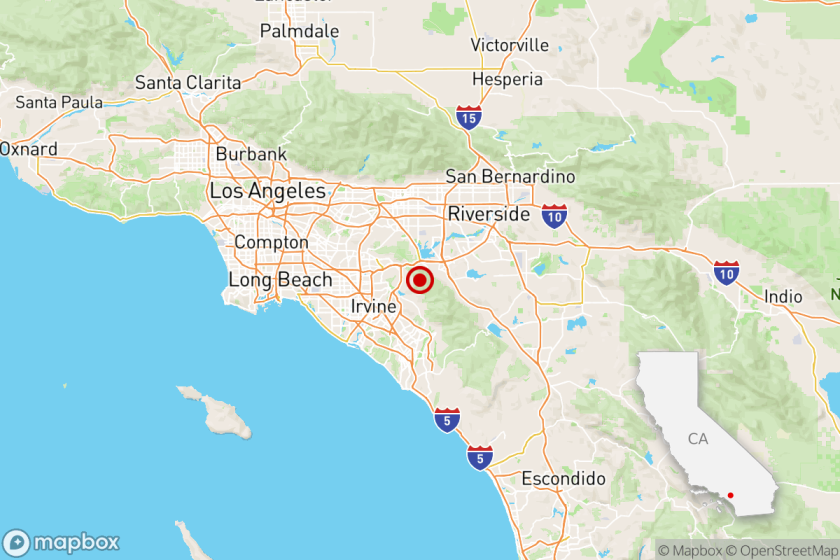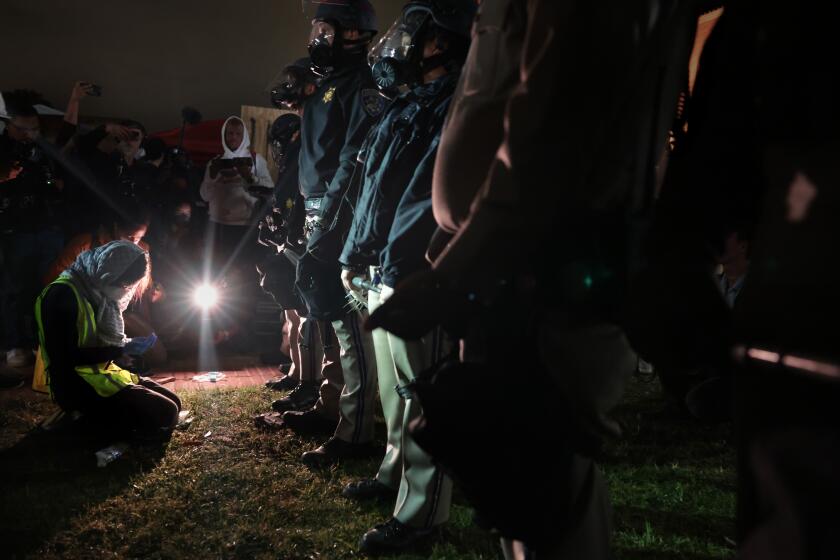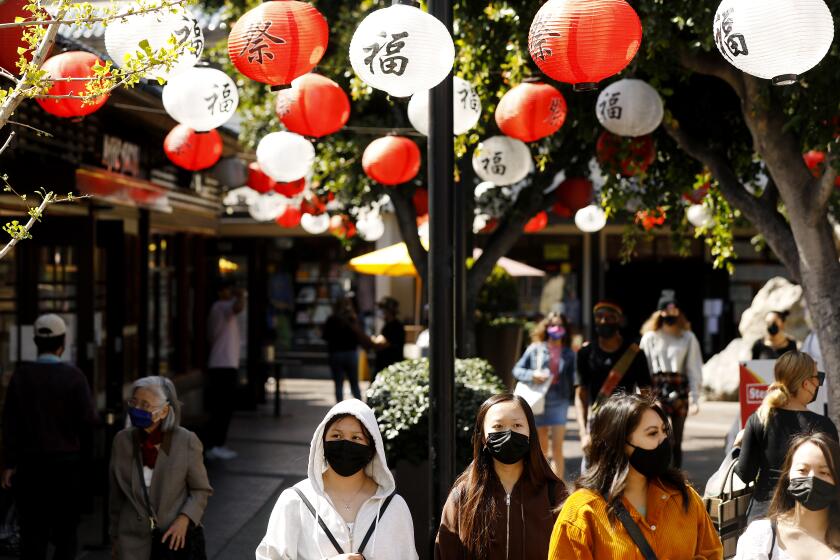A slain mayor is back in the spotlight
Reporting from San Francisco -- Jonathan Moscone had been building toward this moment for nearly 30 years.
His father, Mayor George R. Moscone, was assassinated on Nov. 27, 1978, by former Supervisor Dan White, who sneaked into San Francisco City Hall with a .38-caliber Smith & Wesson and fired four bullets at the mayor — two into his torso and two into his head.
On this winter day in 2008, Moscone is on the set of an Oscar-winning film about that tragic moment. The movie is “Milk,” the story of White’s other victim: Supervisor Harvey Milk, the first openly gay elected official in California and the man who reduced George Moscone to a footnote.
Actor Victor Garber plays the mayor, and he fluffs a line while the younger Moscone watches. Garber stops, apologizes to director Gus Van Sant and prepares to start over.
“Gus Van Sant said, ‘Don’t worry about it,’” Moscone recalled recently. “ ‘It’s just going to be in a montage.’ And he just looked at me.”
That was the moment “Ghost Light” was born, a play about grief and loss, memory and pain, about how Moscone dealt with his father’s death — and how he didn’t. Co-created with Tony Taccone, artistic director of the Berkeley Repertory Theatre, the play premiered this month at the Oregon Shakespeare Festival and travels to Berkeley in January.
In the years since White took aim, Milk has become a gay rights icon. He served just 11 months in elected office, but he’s been the subject of an opera, two movies and a children’s book. Barack Obama awarded him the Presidential Medal of Freedom. California celebrates Harvey Milk Day on May 22.
Even White, who committed suicide after being released from prison, got a theater production, “Execution of Justice,” which was turned into a movie. And George Moscone? A convention center, a park and a handful of buildings bear his name.
Now, finally, he too has a play. “Ghost Light” is not a docudrama, and Moscone insists it is not a means to burnish his father’s legacy, which he believes has been overshadowed.
“When the movie ‘Milk’ was being made,” Moscone said, “I watched the filming, and I just got to thinking that the one power that I have in this world is that I’m a paid professional in the art of storytelling … and I thought, ‘Well, I can make a play.’”
Its creation, he writes in the program notes, “has helped me claim my identity as an adult, as an artist and as a citizen of this world.”
::
Not long after “Milk” was done filming, Moscone invited Taccone out for a drink.
The now-46-year-old had interned at Taccone’s Berkeley Rep in 1989, between college and a graduate degree in directing from the Yale School of Drama. He’d been artistic director of California Shakespeare Theater in nearby Orinda since 2000.
But despite their nearly 20-year friendship — and the fact that Taccone had commissioned “Execution of Justice” — they had never spoken about George Moscone’s death.
So there they were at a now-defunct Berkeley bar, Taccone nursing a vodka and cranberry, Moscone drinking Ketel One on the rocks. “I want to do a piece about my dad,” Moscone told Taccone.
“And he started talking,” Taccone recalled. “The first thing he said to me was, ‘I was in therapy for being freaked out that my father would be killed — before my father was killed.’”
The two men began meeting at Taccone’s Emeryville loft, talking for hours from opposing sofas. Taccone asked questions and took notes. Moscone tried to remember.
Their first topic was the viewing.
Jon, being 14, didn’t have a suit, so his mother sent him with a family friend to shop. He came back with a beige herringbone number — picked, he said, because the fabric looked like the sofa in his father’s den. “Looked like a man’s suit,” Taccone typed into his laptop. “I didn’t want to be a man.”
At the viewing, Moscone recalled, he looked into his father’s open casket and saw that a flap of skin had fallen away from a bullet wound. He reached in and tried to fix it.
“Head of George Moscone, put back together,” Taccone typed. “Just below the right ear, a piece of skin had flapped up a little bit … he put down his finger … Not freaked out about the body.”
Taccone shaped that recollection and the many that followed into “Ghost Light,” a complex meditation filled with accurate historical facts in a fictional frame.
Main character Jon Moscone (the real Jon calls him “me-ish”) is directing a production of “Hamlet” (never happened) and struggling with how to portray the ghost of Hamlet’s father, who has been assassinated. The problem: Moscone had never thoroughly grieved after the killing of his own father.
When Taccone completed an early draft, Moscone told him to send it to him. Taccone did. Then he waited. Called. Waited. After two weeks, Moscone picked up the phone.
Moscone: “I haven’t read it.”
Taccone: “What?”
Moscone: “I’m terrified.”
::
Moscone sits in the lobby of the New Theater in downtown Ashland, vulnerable and guarded. Technical rehearsals have just begun. As light and sound and set are adjusted and actors run through their lines, the production takes shape.
Moscone is talking about his play and his father, about losing both parents — one to an assassin’s bullets, the other, for many years, to a deep depression she eventually conquered.
On a Monday morning in 1978, Dan White loaded his revolver and sneaked into the graceful Beaux-Arts City Hall through a side window. He was hoping to persuade George Moscone to give him his job back.
Three weeks earlier, White had resigned from the Board of Supervisors, citing pay so poor he couldn’t support his family. The mayor was poised to announce White’s successor, but he ushered the agitated man into his office. The meeting went long. Staff members heard muffled pops.
Shouts rang out, “Call an ambulance!” Police arrived. By that time, White was in Milk’s office, gun reloaded. He fired five more rounds.
George Moscone’s 1975 election had ushered in a new era in San Francisco, of the kind of inclusive politics this famously liberal city is known for today. When White struck, many feared that had died along with its champions.
“As the sun sets over San Francisco tonight,” Archbishop John R. Quinn said during the mayor’s service, “it is a different city.”
But it was 14-year-old Jon, all shaggy hair and wide ‘70s tie, who captured the deeply personal pain of losing a father when he read from Paul’s Second Letter to Timothy.
“Whenever I remember you in my prayers, as indeed I do constantly, night and day,” he read, lashes dark on pale cheeks, “I yearn to see you again.”
Twenty years passed before Moscone spoke about his father again in public. At a 1998 memorial for the slain men, he came out as a gay man for the first time. “I wonder how he’d feel…,” an emotional Moscone told the crowd at the War Memorial Opera House, “and I only come up with one word: proud.”
The slaying, Moscone says in the theater lobby, caused his family to “scatter.” The huge public outpouring kept them from addressing their own grief. And that, he says, is central to the play.
“As a family of six people — now five — we were outnumbered by the thousands upon thousands of people who were affected,” he says. “We were overpowered by the size of it, and then, when the size went away, we were left alone.
“And by that point, we were kind of stunned and exhausted and didn’t really know what to do.”
::
The small theater is largely dark. Moscone stands center stage as the performers run through Act I, Scene 9.
It is a dream sequence in which a character named Boy runs in place. The pale child gulps for air, performs frantic push-ups over and over. Moscone crosses his arms, ponders, calls for the sound engineer to try the scene without the low backdrop of ominous, ambient tones.
“There’s enough here, for me, to watch the kid trying to make himself sick,” Moscone says, as they prepare to take up the action again.
The day George Moscone was shot, Jon woke up sick. But not sick enough. If he had been, his father would have taken him to the doctor and been safe.
Instead, young Moscone left for St. Ignatius College Preparatory, where he was a freshman, and the mayor headed to City Hall. The next thing Moscone knew, he and his older brother Chris were yanked out of lunch period, driven home by the fire chief, greeted by a phalanx of reporters and family members.
At least that’s the memory he recounted to Taccone in the playwright’s loft. In the play — in the dream — Boy tries valiantly to make himself sick enough to save his father.
But Moscone said the more he thought about it as the months went by, the more he realized his illness might have occurred as much as two weeks earlier. The memory he carried for 30-some years, though, was one of blame and control.
“I used to have this fear that he would be killed,” Moscone says. “And then when it happened, I thought, part of my fear was that I had a premonition, or that I knew, or that somehow, just because I thought about it, it happened.”
::
The biggest surprise in the three years between idea and opening night, Moscone says, is how difficult it was for him to sit in the audience and watch.
At one point in Act ll, the character Jon tells a friend about the time he caught his image in a mirror and saw his murdered father in himself for the first time.
“And I just smile,” the character says, “…because I can feel that some enormous weight has been lifted off of me. Right there, I just came into a part of myself.” He pauses. “Here today. Gone tomorrow.”
That’s where Moscone begins to cry.
“Ghost Light” opened to largely positive reviews, which acknowledged the play’s broad themes of loss and grief. Those bravos, says a relieved Moscone, are an important validation — that “Ghost Light” is more than just historical score-settling or “self-serving.”
The most important reviews, though, have come from his family.
Gina Moscone, who has never spoken publicly about her husband’s assassination, sat beside her son on opening night. She got the jokes, laughed in the right places, ended the evening in tears. There was only one bad moment.
“She freaked out when the gunshots happened,” Moscone says. “I had to hold her and say, ‘It’s just three more, two more, no more guns.’ At the end of the first act, she said, ‘This is great.’”
More to Read
Start your day right
Sign up for Essential California for news, features and recommendations from the L.A. Times and beyond in your inbox six days a week.
You may occasionally receive promotional content from the Los Angeles Times.
